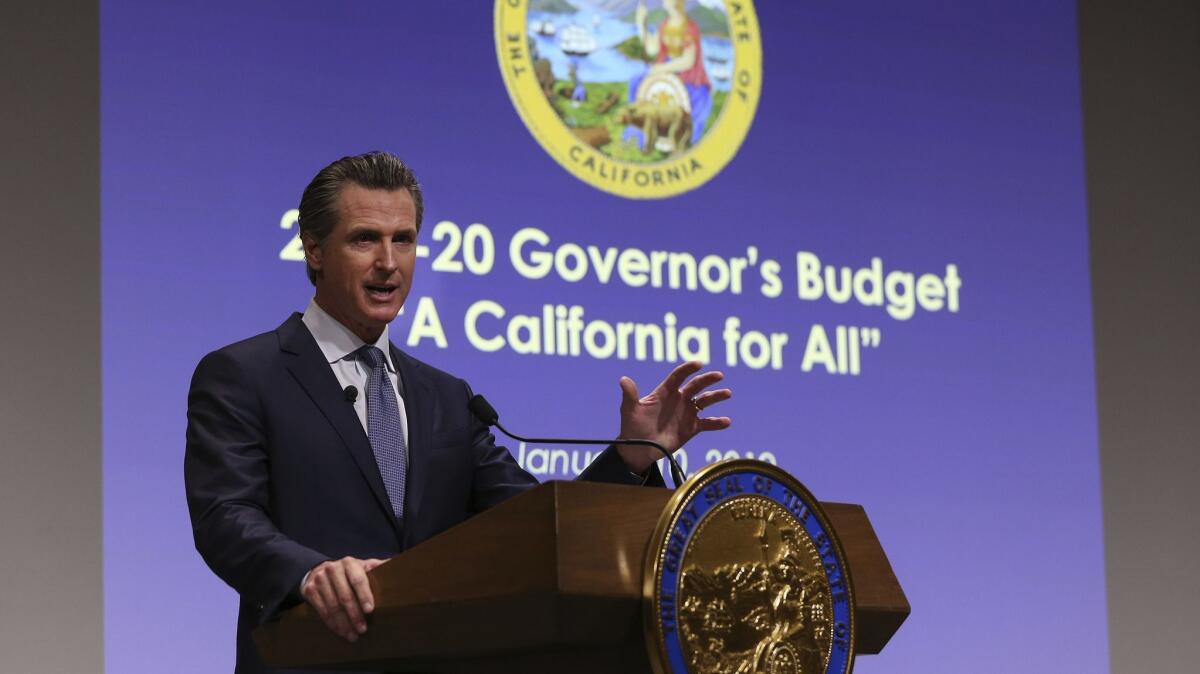Capitol Journal: California voters don’t know much about government. But they do have common sense

- Share via
Reporting from Sacramento — Voters can be weird. They’re often dead wrong on public policy details, but still instinctively arrive at a sensible conclusion.
Here’s an example:
Voters were asked by the Public Policy Institute of California to name the most important issue that new Gov. Gavin Newsom and the Legislature should work on this year. The results were released Wednesday.
Usually when such a question is asked, the answer comes back “jobs and economy” or “education.” This time the most frequent answer was “illegal immigration.”
Guess those voters don’t realize that the federal government, not the states, decides immigration policy.
But then I remembered that after President Trump was inaugurated, the Legislature and then-Gov. Jerry Brown spent months debating and creating a so-called sanctuary state to protect undocumented immigrants from federal customs agents. Legislators and the governor also did other things to help people living here illegally.
So the voters logically can conclude that immigration policy — in some form — is within Sacramento’s portfolio.
And they have strong views about it. Voters overwhelmingly — 62% — oppose President Trump’s proposed border wall. The parties are sharply split: 90% of Democrats against, 81% of Republicans in support.
But there’s a warning in another poll for Democratic legislators who are pushing to extend Medi-Cal healthcare coverage to undocumented immigrants up to age 26. Children under 18 are already covered.
A Quinnipiac University poll released Wednesday found that 52% of California voters oppose providing Medi-Cal for immigrants living here illegally.
I started thinking about the voters’ distorted view of state government while reading the PPIC poll results. Pollster and President Mark Baldassare gave a budget test. Participants were read a list of state spending categories and asked which one ate up the most money in the budget.
The one most frequently cited was health and human services — welfare, Medi-Cal and the like — followed closely by prisons. K-12 schools were a distant third.
That’s nuts, I thought. K-12 is guaranteed roughly 40% of the general fund and Newsom is even proposing a slight bump for the next fiscal year. HHS is getting only about 26% and prisons less than 9%.
But then I remembered special funds. They get scant attention by budgeteers because that money comes from specific sources for specific projects — such as the gas tax for road repairs. It’s the discretionary general fund that attracts all the debate and attention.
Looking at the stack of special funds, I was surprised to discover that the voters were correct about HHS. When the entire $201-billion current budget is considered, more state money is spent on HHS than K-12 schools — roughly 32% compared to 28%.
But voters were still way off about prisons. Out of the entire budget, they get a little over 7%.
Good news for the education lobby: Voters apparently don’t think schools are receiving enough state money. Asked which program should be the highest priority for state dollars, the most frequent answer by far was K-12 schools. HHS was a distant second and prisons way down.
“They clearly think K-12 is not the priority in Sacramento that it is in their own minds,” Baldassare says.
Voters also were quizzed about taxes. They were asked which one generated the most revenue. The most frequent answer was the personal income tax, and that’s correct, but still only 34% got it right. For the entire budget, the income tax furnishes 51% of the revenue. The next closest is the sales tax, far back at 20%.
More voters chose the corporation tax than the sales tax and were way off. It supplies only 6.5% of the revenue. Many also answered motor vehicle fees. Wrong again. Vehicle fees and fuel taxes combined supply just 9% of state money.
Coverage of California politics »
“People don’t pay that much attention to public policy in general,” says Jack Pitney, government professor at Claremont McKenna College and a former Republican political operative. “They’ll say that 15% to 20% of the federal budget goes to foreign aid, when a lot less than 1% does.
“People are guessing and sometimes their guesses turn out to be right.”
The result at the ballot box?
“It’s the same as driving blindfolded,” Pitney says. “You may get away with it for awhile, but sooner or later you crash.”
But in the PPIC poll, 78% of voters said they should have the final say on tough tax-and-spend issues.
Brown spoiled them playing politics. Running for election in 2010, he promised to take any tax increase to the voters. He did and they approved his soak-the-rich income tax hike to fund schools.
That’s not what the founding fathers intended, however, when they created a republican form of democracy. Their idea was that citizens would elect representatives to decide on routine matters of taxes and spending.
“If big decisions are to be made, people want to feel they’re part of it,” Baldassare says. “If they’re not, they feel alienated and left out. And some might decide that what the governor is doing is not in their best interests.”
“If the governor is going to be on the 2020 ballot with something,” the pollster adds, “he’d better start explaining today. He’s dealing with a lot of people who have a very low knowledge.”
Newsom also could learn from the voters. They have an innate ability to be right even when they’re wrong.
Follow @LATimesSkelton on Twitter
More to Read
Get the L.A. Times Politics newsletter
Deeply reported insights into legislation, politics and policy from Sacramento, Washington and beyond. In your inbox twice per week.
You may occasionally receive promotional content from the Los Angeles Times.











